The clash of great powers to control the Middle East, particularly between the U.S. and the U.S.S.R., neither began after World War II nor ended with the demise of the Soviet Union in 1991. Today, China, the U.S., Russia and Middle Eastern regional powers vie to influence everyday politics and resources. Treasured by foreigners, the region will remain coveted for centuries to come. The three major elements that have shaped Middle Eastern history for thousands of years will not disappear: its geographic location at the eastern end of the Mediterranean Sea, linking north and south and east and west; its historical place as the cradle to the three major monotheistic religions, where it has radiated an insatiable thirst by worldwide followers to assert presence and control; and the availability of the world’s largest known oil and gas reserves.
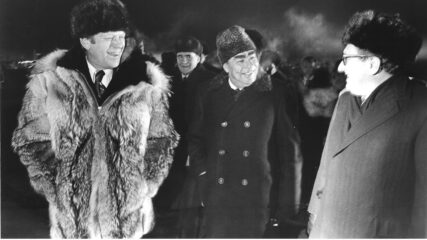
The clash of great powers to control the Middle East, particularly between the U.S. and the U.S.S.R., neither began after World War II nor ended with the demise of the Soviet Union in 1991. Today, China, the U.S., Russia and Middle Eastern regional powers vie to influence everyday politics and resources.
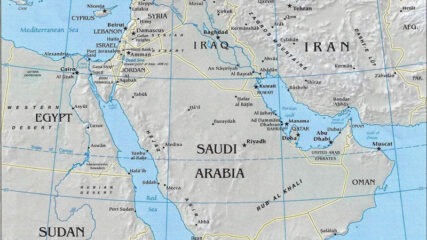
CIE has compiled the following list of books, articles and videos, including some available on our website, to guide understanding of the great world powers and their involvement in the Middle East. Books Alterman, Eric,…
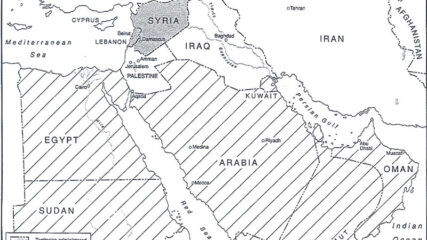
The post-WWI San Remo Conference allocates former Ottoman territories to Britain and France and recognizes Jewish self-determination in Palestine by adopting the language of the Balfour Declaration, decisions the League of Nations confirms two years later.
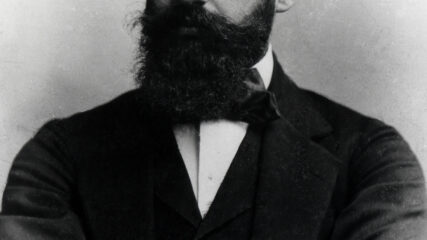
Born in Hungary, Herzl is viewed as the father of modern political Zionism. A journalist, novelist and playwright, he embraced Zionism after reporting on Alfred Dreyfus’ trial in France. His pamphlet “Der Judenstaat” (“The Jewish…
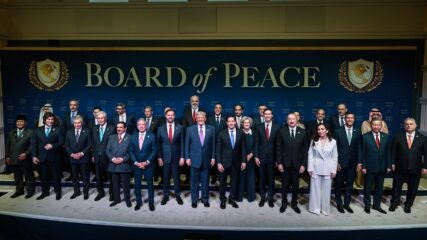
The first meeting of the Board of Peace convened under the Trump ceasefire for Gaza offers grand plans for reconstruction and a vibrant, peaceful future for Palestinians but depends on the disarmament of Hamas.

Nine questions guide key understandings about Theodor Herzl’s “The Jewish State.”

While the Palestinian official leading the technocratic Gaza administration promises to open the Rafah Crossing and the Bulgarian high commissioner for Gaza urges the world to focus on the big picture, U.S. envoy Jared Kushner lays out a vision for Gaza as a rapid, phased real estate redevelopment.

The Trump administration’s proposed charter for the Board of Peace, the body the United Nations has charged with overseeing the Gaza ceasefire, does not mention Gaza or any other specific location of operation but does grant its chairman, Donald Trump, extensive control over its mission and operations.

January 2, 2026 A week of unrest in Iran does not guarantee a revolution even if 85-plus million Iranians are angry at the country’s autocratic, theological rulers. Iran is a security-clerical oligarchy where kleptocracy, cronyism…
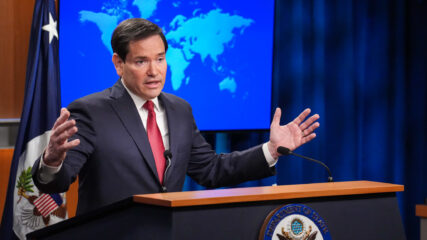
Secretary of State Marco Rubio explains the urgent need to establish the Board of Peace and the International Stabilization Force for Gaza to move from Phase 1 to Phase 2 in the ceasefire, but he also warns that the work likely will last longer than the Trump administration.
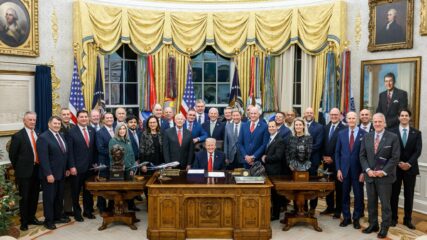
The fiscal 2026 National Defense Authorization Act shifts U.S. military cooperation with Israel to a postwar focus, including support for neighbors facing Iranian proxies and a response to military embargoes of Israel.
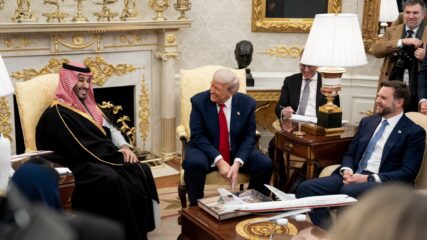
Prince Mohammed bin Salman and President Donald Trump continued a decades-long process of strengthening Saudi-U.S. ties during a White House meeting that put Saudi security and investment ahead of the Abraham Accords.

The U.N. Security Council voted 13-0 on November 17, 2025, to adopt Resolution 2803, endorsing the 20-point Trump peace plan to end the Hamas-Israel war. The precedent-setting resolution provides a pathway to stability in the Gaza Strip and offers a chance for less violence in the Palestinian-Israeli relationship.
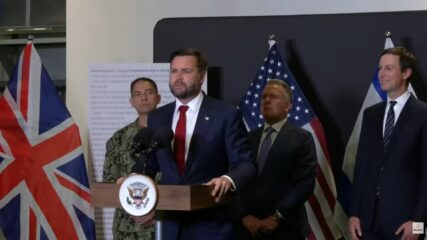
Visiting Israel, U.S. Vice President JD Vance expresses optimism about the rocky Hamas-Israel ceasefire and broader hopes for Middle East peace while refusing to set deadlines for Hamas to disarm or return all hostage bodies.

U.S. Middle East envoys Jared Kushner and Steve Witkoff express confidence in a “60 Minutes” interview that the Trump peace plan will succeed in Gaza after two years of the Hamas-Israel war.
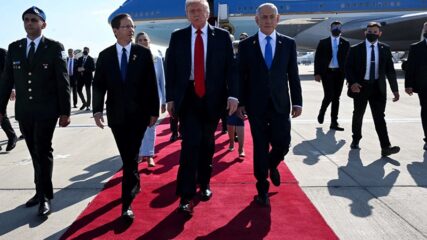
Donald Trump takes a victory lap and lays out short- and long-term visions for Gaza, Israel and the Middle East while becoming the fourth U.S. president to address the Knesset.
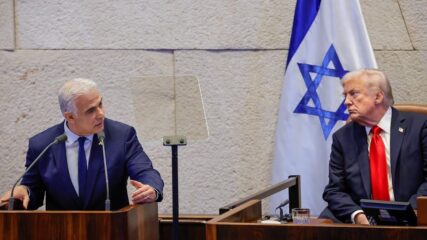
Opposition leader Yair Lapid, addressing the Knesset, praises Donald Trump for brokering the Gaza peace plan, calls on his fellow Israelis to renew their values-based democracy, and warns Israel’s enemies in the Middle East and beyond that the Jewish state is here to stay.
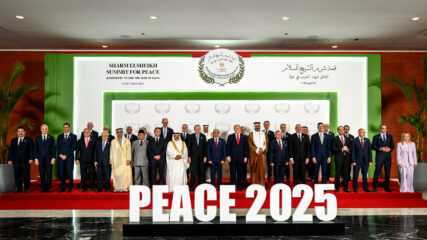
The U.S., Turkey, Qatar and Egypt commit to trying to implement President Trump’s vision for enduring peace in Gaza and the entire Middle East without offering details or obtaining the sign-on of Israeli or Palestinian officials.
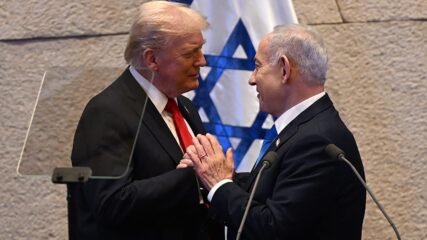
In a Knesset speech, Prime Minister Netanyahu delivers effusive praise for President Trump’s Middle East peacemaking even though the U.S. plan appears to have put the support of key Muslim powers in the region ahead of sign-on from Israeli or Palestinian officials.
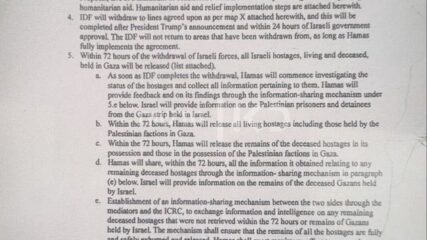
A memo obtained by multiple news organizations in early October 2025 explains the implementation plan for the U.S.-brokered Gaza ceasefire.
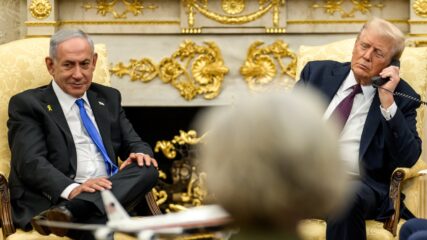
President Trump and Prime Minister Netanyahu explain their expansive vision for a peaceful Middle East through the implementation of a 20-point U.S. plan to end the Gaza war with the support of many Arab and Muslim countries.
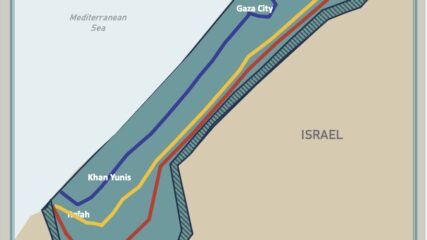
A comprehensive U.S. plan to end the Hamas-Israel war is unveiled eight days before the second anniversary of the October 7, 2023, Hamas attack.

Divine, Donna Robinson, Politics and Society in Ottoman Palestine: The Arab Struggle for Survival and Power, Lynne Reinner Publishers, Boulder, 1994, pp. 191-215 (with author’s permission, September 2025) This is a rigorous analysis of the struggles of…
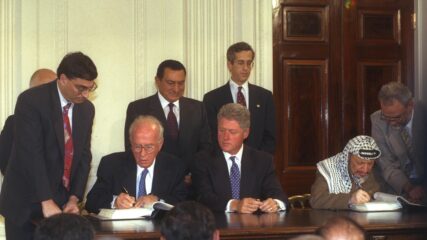
September 28, 1995 After signing the Declaration of Principles (DOP) on Interim Self-Government Arrangements, commonly known as the Oslo Accords, on September 13, 1993, Israel and the PLO reached three additional interim agreements before Oslo…
Page: 1 of 12 1 2 3 ...
12
























